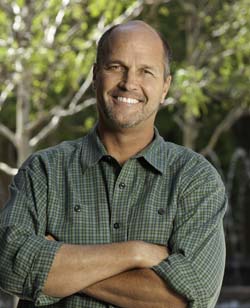 |
 |
| current issue |  | past issues |  | send a letter/news |  | address update |  | advertise |  | about us |  | alumni home |
Features
|
Chris Stone '79 An open-source software proponent, his first company developed the foundation for "the cloud;" now he's with Epic Ventures By Sandra Hume '92 |
Easy to print version |

|
His name may not have brand recognition, but after Chris Stone '79 graduated from UNH, his resume has been littered with names etched into the very bedrock of today's technology: Novell, Linux, Open Source, CORBA. After a decade with other companies like Data General (now EMC) and earning a degree from Harvard Business School, by 1989 Stone was on his own, banking on his own ideas.
Ideas, it should be said, that are still relevant now. The very first company he started, Object Management Group, developed the foundation for distributed computing, which, filtered into today's vernacular, is what we common folk refer to as "the cloud."
"OMG was very involved in the early days of the development, formation and success of Object Oriented programming and Linux, and over the years helped bring Networking and Linux to the masses through investment and acquisition," says Stone. The most ubiquitous sites on the Internet use Linux operating systems, he says. "All of Google? Linux. All of Yahoo!? Linux." Object Oriented programming is now the norm of all software development.
Recruited by Eric Schmidt (Google Chairman) and Novell in 1996, Stone ran their Corporate Development and Venture group until 2000, then returned in 2001 to become COO until 2004. His team, along with competitor Red Hat, made Open Source and Linux commercially viable. He was even at the center of the biggest tech lawsuit ($3 billion) in history...and won.
|
"Venture capitalism is more about people than technology—without the right people and the right management team, I don't care how cool your product is." —Chris Stone '79 |
Today he's a venture capitalist with Epic Ventures, where recognizable investments include Ancestry.com, Red Hat Software DivX, the first video player of the Internet (which ultimately went public), and online backup company Mozy. He spends most of his days networking, finding entrepreneurs whose fresh ideas might end up the next big thing. Oh, and skiing.
Which brings us to some truths about what, according to Stone, successful entrepreneurship means.
It means enjoying yourself. Stone, a father of five (including two sons, Cameron '13 and Graylan '13, who are juniors at UNH), splits his time between Boston, Nantucket and Park City, Utah, favoring the latter for more than half the year (winter). His wife, Nancy (Boxshus) was a 79 grad. "People tell me 'Your work is my vacation,'" Stone says, and with a working lifestyle that allows for four or five ski runs before the day begins, it sure can seem that way. But the real truth is that Stone has learned real success comes from creating a life you enjoy living.
It means liking people. "Venture capitalism is more about people than technology," Stone says readily. Meeting new people—typically young adults from their late 20s to late 30s—and talking about their ideas is the best part of his job. Other VCs might claim it's all about the product, but "without the right people and the right management team, I don't care how cool your product is."
It means widening your scope. While Salt Lake City-based Epic Ventures does invest in firms in the traditional tech hotbeds of the coasts, it concentrates in the mountains states; nearly half of the company's eight investments so far in 2011 are based in Utah. "It isn't just about Boston or Austin or Silicon Valley," Stone says, citing Utah's robust, up-and-coming engineering technology community. And with the outdoor-oriented lifestyle and a 20- to 30-percent lower cost of living than the coasts, Utah's quality of life can't be beat.
It means failing. Of the four companies Stone started before becoming a venture capitalist, two he sold, one is still in business, and in one case, "I burned through $48 million in venture money. It was a miserable failure." But he came out of the experience with something more valuable: the knowledge that he wasn't invincible. Success can breed the "smartest guy in the room" syndrome; without your mistakes, Stone says, you're not as attentive to the people whose money you're using—in his case, the limited partners who provide Epic with investment capital—and those who are spending that money. "You can only give these young CEOs so much advice," he says. It helps to give them the chance to learn from mistakes without having to make them themselves. "I can say, 'Look, I did this five times. It didn't work five times. What makes you think it's going to work now?' If you talk about what you've blown, they listen more. But if all you do is flaunt your wins, they tend to tune out." (And? His company turned down Twitter, Omniture, LinkedIn and others... Whoops.)
It means not needing to be a star. In the marathon of a business's life, Stone is the guy who buys the good running shoes, trains for his best time, and prepares perfect race pacing. But by the time the starting gun goes off, he's well onto the next thing. The majority of his career points—like Distributed Computing or the operating system Linux, one of the milestones of open-source programming—have to do with foundations and infrastructure. "By the time you're clicking the button on the user interface, my work is done." He laughs. "It's more fun behind the scenes."
Easy to print versionBack to "They've Been There"
blog comments powered by Disqus
